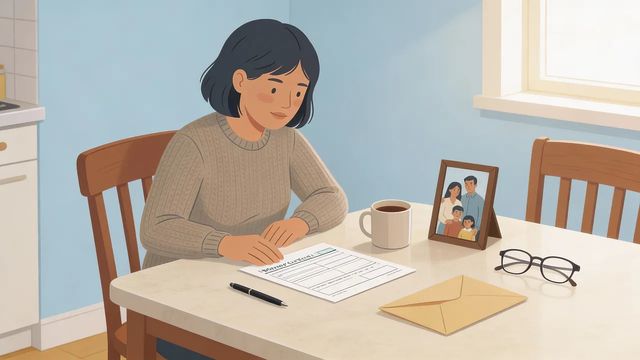Florida Womens Reception Center, FL
Need to reach someone at Florida Womens Reception Center? Look up an inmate, send messages or mail, add commissary funds, or schedule a visit.
Explore
Find an Inmate at Florida Womens Reception Center, FL
Search for a loved one and send messages and photos in minutes.

Guides for This Facility

How to Send Money by Mail to Someone at Florida Women's Reception Center (JPay money orders)
Make the money order payable to JPay. Getting the payee name wrong can delay the deposit or cause rejection.
Read Guide
How to Send Money to an Inmate at Florida Women's Reception Center (JPay & Money Orders)
Sending money to someone at Florida Women's Reception Center is straightforward once you know the options. Here's what the facility accepts and what you'll need to avoid delays.
Read Guide
How to Fill Out Florida's DC6-111A Visitation Application Without Getting Denied
The DC6-111A trips people up on a few strict points: you must wait for approval before visiting, you can't leave any blanks, and everything has to be accurate. Here's how to fill it out right the first time.
Read GuideAt a Glance
Visitation
- You must not visit until the inmate notifies you that your visitation application has been approved.
- Visitors aged 12 and older must complete the visitation application; only one application may be submitted per person and the form must be signed and contain no blanks.
- Visitors 16 and older must present a valid photo ID to enter the visiting area.
Communication
- Each incarcerated person at Florida Women’s Reception Center receives one free GTL/ConnectNetwork call of up to 5 minutes per week.
- Incarcerated individuals may place calls up to 30 minutes in length.
- There is a 30‑minute waiting period after each completed call for an incarcerated individual.
Mail & Letters
- Mail money orders and the completed deposit slip to JPay at PO Box 260010, Hollywood, FL 33026.
- If sending funds by money order, you must provide a copy of your photo identification with the payment.
- Incoming correspondence may be classified and inspected; privileged/legal mail is often handled differently than general mail.
Sending Commissary
- Money orders for inmate deposits must be made payable to JPay.
- Mail money orders and the completed deposit slip to JPay at PO Box 260010, Hollywood, FL 33026.
- You must be on the inmate’s Approved Visitors List to send them money via a mailed money order.
Inmate Lookup
- Enter the inmate’s last and first name and add date of birth or booking number to narrow search results.
- Check result details such as DOB, race/sex, location, charges, booking date/time and bond status to confirm identity.
- Visitors must not visit until the inmate notifies them that their visitation application has been approved.
Contact Info
- Normal visiting hours are 9:00 AM to 3:00 PM on Saturdays and Sundays, and 8:00 AM to 2:00 PM Central Time on weekdays.
- Visitors may bring up to $50 in cash (specific denominations only) to purchase snacks and beverages from visiting‑area vending machines.
- GTL/ConnectNetwork provides one free phone call of up to 5 minutes per incarcerated individual each week.
Facility Info
- Visitors are instructed to read the facility's attached visitor policies before visiting.
- The inmate handbook is the primary source for facility-specific rules, programs, and procedures.
- Intake commonly includes property inventory, booking (photo and fingerprints), medical screening, and opening an inmate account for commissary.
Based on official sources and community feedback.Learn how we verify
Topic Overviews
Visitation
Wait until the inmate confirms your visitation application is approved before heading to Florida Women's Reception Center. Everyone 12 and older needs to submit their own signed application—one per person—and leaving blanks can get you denied. Visitors 16+ must bring valid photo ID. Expect searches of yourself and your belongings; refusing means you'll be turned away, possibly for future visits too. Dress code is enforced: shirts and shoes required, no Heelys or footwear with removable parts, and dresses, skirts, or Bermuda shorts can't be more than three inches above the knee. You can bring limited items: up to $50 cash in specified denominations for vending machines, one vehicle key, and restricted medical or infant supplies. Hours run weekends 9:00 AM–3:00 PM and weekdays 8:00 AM–2:00 PM (Central), with no processing after 2:00 PM.
Read full guideCommunication
Phone service at Florida Women's Reception Center runs through GTL/ConnectNetwork. Each incarcerated person gets one free call per week, up to five minutes. After that, calls can last up to 30 minutes, with a required 30-minute wait between completed calls. Want to make sure your loved one can reach you? Set up an AdvancePay prepaid account. The easiest way is online through the vendor's Florida DOC setup page or through their phone app. If you run into trouble, the vendor offers 24/7 live phone support.
Read full guideMail & Letters
Sending funds to someone at Florida Womens Reception Center? The facility uses JPay for mailed deposits. Send your money order with the completed deposit slip to JPay at PO Box 260010, Hollywood, FL 33026—and include a copy of your photo ID. For letters and permitted items, keep it simple to avoid delays: use the inmate's full name and booking/ID number, include your full return address, and stick to plain paper with acceptable envelopes. Mail is typically opened or inspected by staff. Some facilities use third-party digital mail scanning, and retention practices vary.
Sending Commissary
Florida Women's Reception Center accepts inmate deposits by mailed money order through JPay. Make the money order payable to JPay, include the completed deposit slip, and mail everything to PO Box 260010, Hollywood, FL 33026. You must be on the inmate's Approved Visitors List and include a copy of your photo ID. No JPay account needed for mail-in deposits—helpful if you'd rather skip online registration. Once JPay receives an approved money order, processing takes up to ten (10) business days. Need help with the deposit form? Call JPay at 800-574-5729.
Read full guideCommon Questions
Showing 6 of 21Do I need approval before visiting Florida Women’s Reception Center?
Yes. Do not show up to visit until the inmate notifies you that your visitation application has been approved.
VisitationWhat are the visiting hours at Florida Women’s Reception Center and when does entry processing occur?
Visiting hours are Saturdays and Sundays from 9:00 AM–3:00 PM and weekdays from 8:00 AM–2:00 PM (Central). Entry processing starts early, but no visitors are processed after 2:00 PM.
VisitationWhat ID, clothing, and items am I allowed to bring for a visit?
Visitors 16 and older must bring a valid photo ID, and all visitors must submit to searches of their person and possessions. Wear a shirt and shoes; Heelys, footwear with removable parts, and dresses/skirts or Bermuda shorts more than three inches above the knee are not allowed. Items are limited, but can include up to $50 cash for vending machines, one vehicle key (keyless devices are generally not allowed unless approved after inspection), prescription medication in the original labeled container (only what you need), and limited baby supplies like diapers and clear bottles.
VisitationDoes Florida Women’s Reception Center offer a free call each week?
Yes. GTL/ConnectNetwork provides one free phone call of up to five minutes for each incarcerated person every week.
CommunicationHow long can someone at Florida Women’s Reception Center talk on a call?
Calls may be up to 30 minutes long. After each completed call, there’s a required 30‑minute waiting period before another call can be placed.
CommunicationHow do I set up AdvancePay so someone at Florida Women’s Reception Center can call me?
AdvancePay is a prepaid calling account you fund so an incarcerated person can call you. You can set it up and manage it online through the vendor’s Florida DOC page or via the vendor phone/app, and vendor phone support is available 24/7.
CommunicationMore Guides
Ready to Connect?
Search for your loved one to start communicating today
Did You Know?
Don't visit Florida Womens Reception Center until the inmate confirms their visitation application has been approved. Wait for that confirmation before making travel plans or showing up at the facility.
This guide is based on feedback from 143 families and official facility documentation. Learn how we verify
